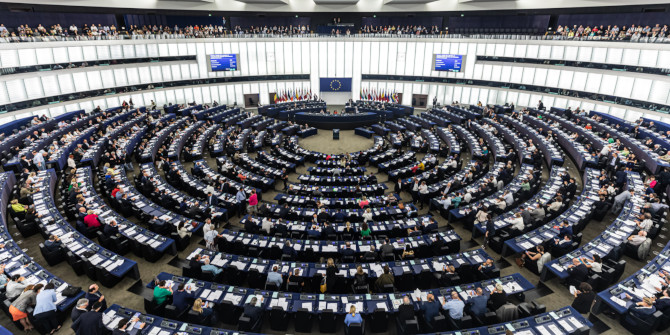 What are the key factors underpinning the stand-off between Russia and the West over Ukraine? Roland Dannreuther writes that while tensions escalated in the immediate aftermath of Russia’s annexation of Crimea, the Arab Spring had a significant role in framing the eventual confrontation. He notes that disagreements over the West’s intervention in Libya had a key impact on the domestic balance of power within Russia, while fears of protest movements threatening the regime of Vladimir Putin helped foster a deep suspicion of Western approaches to democracy promotion.
What are the key factors underpinning the stand-off between Russia and the West over Ukraine? Roland Dannreuther writes that while tensions escalated in the immediate aftermath of Russia’s annexation of Crimea, the Arab Spring had a significant role in framing the eventual confrontation. He notes that disagreements over the West’s intervention in Libya had a key impact on the domestic balance of power within Russia, while fears of protest movements threatening the regime of Vladimir Putin helped foster a deep suspicion of Western approaches to democracy promotion.
The perception that the world is returning to a new Cold War is most closely associated with developments in Europe during 2014. This includes the Russian annexation of Crimea, the support provided by Moscow to the secessionists in Eastern Ukraine, and the subsequent Western imposition of economic sanctions on Russia.
However, in the previous three years from 2011-2014, it was the Middle East where conflict between the West and Russia showed the most visible signs of renewed forms of Cold War-style confrontation. The main catalyst for this was Russian and Western divisions over policy towards Syria and whether or not to support the overthrow of the regime of Bashar al-Assad.
But the roots of the conflict between Russia and the West were both broader and more comprehensive, involving a fundamental disagreement about how to conceptualise and understand the changes heralded by the Arab Spring. Understanding these more substantive causes for the conflicting Russian and Western views of the Middle East provide significant insights into the subsequent Russian response toward Ukraine.
Russia, Syria and the Arab Spring: supporting the Arab counter-revolution
In a recent article in the Journal of European Integration, I argue that the consequences of the Arab Spring on Russian-Western relations had three main dimensions. The first is that the Russian abstention in March 2011 over the UN Resolution mandating humanitarian intervention in Libya was the trigger for a major shift in domestic political power in Russia.
President Dmitry Medvedev supported this abstention, and was rumoured to have supported a vote in favour, reflecting his determination to maintain cordial relations with the West and to protect Obama’s ‘reset’ policy. But Prime Minister Vladimir Putin strongly criticised the decision not to veto the resolution, arguing that it ‘allows anyone to do anything they want – to take any actions against a sovereign state. Basically, all this reminds me of is a medieval appeal for a crusade’. Medvedev then responded, stating that ‘it was inexcusable to use expressions… such as “crusades”’.
At the time, this altercation was interpreted as a politically stage managed difference of elite opinion, meeting the differing expectations of domestic and international audiences. But, in retrospect, this moment was pivotal. It marked the point where elite and popular support and opinion decisively shifted from Medvedev, or more importantly the liberalising and modernising agenda that he represented, to Putin and his more instinctive anti-Western, inward-looking and conservative agenda. The Libyan conflict, and particularly the events which led to NATO military intervention and the death of Muammar Gaddafi, provided the political assurance for the success of Putin’s leadership campaign to be re-elected President.

The second dimension is how Putin, and Russian analysts more generally, viewed Western policies in the Middle East through the lenses of their own concerns over Western influence and ambitions in Russia and the post-Soviet space. The anxiety was particularly acute as the crises in both Libya and Syria coincided with the rise of opposition to the re-election of Putin, with unprecedented large opposition rallies in Moscow and other cities in Russia during 2011-12.
For Putin and his entourage, there were clear parallels with Western democracy promotion in the Middle East and rising opposition and societal conflict within Russia. The lesson they took from events in Libya and Syria was that the West’s commitment to ‘democracy’ meant a willingness to break up societies, to use force, and to impose the wishes of an elite pro-Western minority on the majority. The interpretation was that ‘we must not allow the ‘Libyan scenario’ to be reproduced in Syria’. Even more important, of course, was that the ‘Libyan scenario’ should not be reproduced in Russia or in key neighbours, such as Ukraine.
The final dimension reflects the more intellectual rationalisation of this negative view of Western democracy promotion. This is often ignored as there is a tendency to explain Russian behaviour in rather simple geopolitical zero-sum terms. Although this is undoubtedly an important element, there is also a more serious ideational or ideological foundation to this opposition.
This can be seen in the development in the mid-2000s of the concept of ‘sovereign democracy’. The intellectual core of this concept, developed by Vladislav Surkov, is the rejection of liberal pluralist conceptions of democracy requiring the division of society into competing factional groups. For conservative Russian elites, the evidence of the Arab Spring confirms that such factional divisions in the guise of democracy promotion only lead to internal disorder, societal conflict and the loss of the sovereign integrity of the state. There is, for such elites, a resonance with Russia in the 1990s when the country came close to internal disintegration and civil conflict.
Liberal democracy is not necessarily rejected out of hand. The ‘sovereign democracy’ concept does not exclude the fact that such a form of state might be appropriate for advanced post-industrial Western societies where the underlying political culture is sufficiently consensual to permit such open dissension without undermining the integrity of the state. However, the concept articulates the view that this is not appropriate for most states, not only in places like the Middle East but also in Russia, which have different inherited historical and political cultures, and where any attempt to implement this would lead to the loss of sovereignty and conflict and anarchy.
The evolution of Western-Russian divisions and confrontation in the Middle East, and particularly over Syria, provide a number of key insights into explaining why Russia responded in the way that it did to the ensuring crisis in Ukraine. While Russia succeeded in resisting Western pressure and attempts to de-seat Assad in Syria, it failed to do so with President Yanukovych in Ukraine. What Russia was not willing to do in 2014 was to submit to this as a fait accompli as it had done in Libya.
Please read our comments policy before commenting.
Note: This article gives the views of the author, and not the position of EUROPP – European Politics and Policy, nor of the London School of Economics.
Shortened URL for this post: http://bit.ly/1CdM7PR
_________________________________
 Roland Dannreuther – University of Westminster
Roland Dannreuther – University of Westminster
Roland Dannreuther is Dean of the Faculty of Social Sciences and Humanities at the University of Westminster.






Putin sees the Arab Spring or the Ukrainian movement for democracy as Western staged coups. A view which is offensive to millions of people in these countries who just had enough with their abusive regimes.
Not only was not the West behind those events, but the West had to scramble to readjust its connection after everything erupted.
Egypt is a great illustration where the people revolted despite the West, not because of the West. In Libya, France, Italy etc had lucrative deals with Gaddafi and had to make a volte-face when the opposition grew stronger
When Putin carved “two Crimeas” from Georgia in 2008, the Arab Spring had yet to happen. Putin seems to repeating a similar scenario. Only the pretext changes.
The intervention in Iraq could have been a better excuse for his behavior, but brought no significant change in Moscow’s actions, because what Putin does internationally is not a reaction to the West, but a extension of his domestic rule. It is only about strengthening his grip to power for him.
And no, I still believe his race against Medvedev was a sham.
“The ‘sovereign democracy’ concept does not exclude the fact that such a form of state might be appropriate for advanced post-industrial Western societies where the underlying political culture is sufficiently consensual to permit such open dissension without undermining the integrity of the state. ”
I cannot agree more. I’ve thought about for months. In Russia, there is indeed no consensus on our political culture. Are we capitalists, should we return to communism oder some form of charismatic nationalism? It makes political process so shaky.